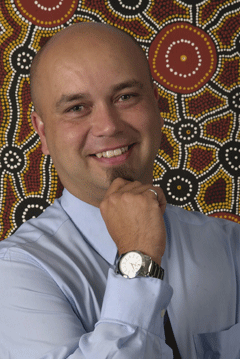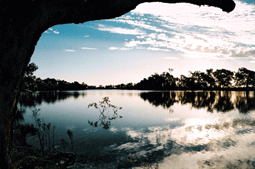Quenching Australia’s Thirst
Air Date: Week of March 24, 2006

Brad Moggridge in front of a painting he made about three groundwater sites in his tribal area. (Photo: Sherran Evans, UTS)
Brad Moggridge is a hydro-geologist with the New South Wales Department of Environment and Conservation. He's found a way, through cultural research, to tap his aboriginal heritage for solutions to Australia's modern day water problems.
Transcript
GELLERMAN: Brad Moggridge stands in two worlds. He’s an aboriginal Australian and a scientist. Specifically, a hydro-geologist with the New South Wales Department of Environment and Conservation. And his latest research is a bridge of sorts linking a culture that has survived for centuries in one of the driest places on Earth with Australia’s growing need for water. Mr. Moggridge joins me on the phone from New South Wales. Thank you very much!
MOGGRIDGE: Thank you.
GELLERMAN: What tribe are you with?
MOGGRIDGE: It’s the Kamilaroi people. We’ve got probably the second-largest tribe in the state of New South Wales.
GELLERMAN: I was reading some research you did, and it seems that your tribe lived in a desert or semi-arid land for thousands and thousands of years. How did they do that?

Brad Moggridge in front of a painting he made about three groundwater sites in his tribal area. (Photo: Sherran Evans, UTS)
GELLERMAN: So if I was to go out into the Outback and follow a dingo or these ants, chances are good I’d find water?
MOGGRIDGE: (Laughs) If you’re in the right country, yeah. Potentially they could lead you to your death! (Laughs)
GELLERMAN: (Laughs) I’ve got a feeling that’s exactly where I’d wind up.
MOGGRIDGE: (Laughs) Yeah, it took aboriginal people to know their environment a long time.
GELLERMAN: Now, you have based your work on oral histories and rock art and artifacts, and dream time stories. What are dream time stories?
MOGGRIDGE: Dream time stories in modern day terms we could say similar to the bible. So it talks about the creation, and those stories that relate to natural springs would be passed on from generation to generation by the elders, the old people in a tribe, to the next generation when they’re ready. So that was the way they passed that information on, and those people would know where those natural springs were.

Boobera Lagoon in northwest Australia is a sacred site to he Kamilaroi people. The lagoon has a dreamtime story linked to it involving the Kurrea, a snake-like creature. (Photo: Brad Moggridge)
MOGGRIDGE: Yeah, I did. A number of my...my grandmother used to talk of these stories. The down point, I suppose, is that authorities – water managers, governments – don’t seem to access aboriginal knowledge. It’s quite sad because they have so much knowledge and so much to offer to move this country forward in a way that they can sustainably manage the environment and water. But they don’t want to listen to them.
GELLERMAN: Australia’s having a tough time of water lately.
MOGGRIDGE: Certainly is, yeah. We’re in a water crisis, we’re in drought situation. Sydney hasn’t had much good rain – especially in the drinking water catchment – a decent rain for a number of years. And, you know, the authorities are looking at alternatives – and I think potentially talking to the aboriginal people is a start – but, you know, they’re looking to modern science, whether it’s desalination or drilling deep bores into aquifers. But if aboriginal people can survive for thousands of years I think authorities should be asking the question of how they did it and how they can help us, you know, as a modern society, survive in such a dry continent.
GELLERMAN: Mr. Moggridge, thank you very much.
MOGGRIDGE: No worries.
GELLERMAN: Brad Moggridge is currently principle policy officer in the New South Wales Department of Environment and Conservation.
Links
Living on Earth wants to hear from you!
Living on Earth
62 Calef Highway, Suite 212
Lee, NH 03861
Telephone: 617-287-4121
E-mail: comments@loe.org
Newsletter [Click here]
Donate to Living on Earth!
Living on Earth is an independent media program and relies entirely on contributions from listeners and institutions supporting public service. Please donate now to preserve an independent environmental voice.
NewsletterLiving on Earth offers a weekly delivery of the show's rundown to your mailbox. Sign up for our newsletter today!
 Sailors For The Sea: Be the change you want to sea.
Sailors For The Sea: Be the change you want to sea.
 The Grantham Foundation for the Protection of the Environment: Committed to protecting and improving the health of the global environment.
The Grantham Foundation for the Protection of the Environment: Committed to protecting and improving the health of the global environment.
 Contribute to Living on Earth and receive, as our gift to you, an archival print of one of Mark Seth Lender's extraordinary wildlife photographs. Follow the link to see Mark's current collection of photographs.
Contribute to Living on Earth and receive, as our gift to you, an archival print of one of Mark Seth Lender's extraordinary wildlife photographs. Follow the link to see Mark's current collection of photographs.
 Buy a signed copy of Mark Seth Lender's book Smeagull the Seagull & support Living on Earth
Buy a signed copy of Mark Seth Lender's book Smeagull the Seagull & support Living on Earth

